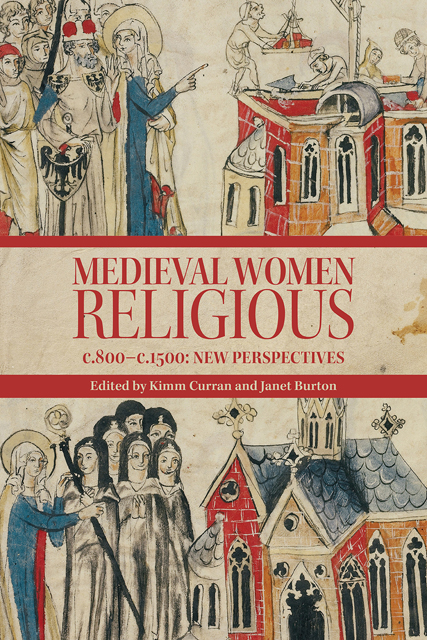Book contents
- Frontmatter
- Contents
- Illustrations
- Contributors
- Preface
- Abbreviations
- Introduction
- 1 Reform, Change, and Renewal: Women Religious in the Central Middle Ages, 800–1050
- 2 New Movements of the Twelfth Century: Diversity, Belonging, and Order(s)
- 3 Change and Renewal: Mendicants and Tertiaries in Later Medieval Europe
- 4 On the Fringes: Anchorites
- 5 ‘Quasi-religious’: Vowesses
- 6 Authority and Agency: Women as Heads of Religious Houses
- 7 Women Religious, Secular Households: The Outside World and Crossing Boundaries in the Later Middle Ages
- 8 Literacies, Learning, and Communal Reform: The Case of Alijt Bake
- 9 Family and Friends: Gift-giving, Books, and Book Inscriptions in Women’s Religious Communities
- 10 Communities of Medieval Religious Women and Their Landscapes
- 11 Materiality and Archaeology of Women Religious
- 12 Between Collective Memory and Individual Remembrance in Women’s Religious Communities
- Select Bibliography
- Index
- Miscellaneous Endmatter
2 - New Movements of the Twelfth Century: Diversity, Belonging, and Order(s)
Published online by Cambridge University Press: 08 June 2023
- Frontmatter
- Contents
- Illustrations
- Contributors
- Preface
- Abbreviations
- Introduction
- 1 Reform, Change, and Renewal: Women Religious in the Central Middle Ages, 800–1050
- 2 New Movements of the Twelfth Century: Diversity, Belonging, and Order(s)
- 3 Change and Renewal: Mendicants and Tertiaries in Later Medieval Europe
- 4 On the Fringes: Anchorites
- 5 ‘Quasi-religious’: Vowesses
- 6 Authority and Agency: Women as Heads of Religious Houses
- 7 Women Religious, Secular Households: The Outside World and Crossing Boundaries in the Later Middle Ages
- 8 Literacies, Learning, and Communal Reform: The Case of Alijt Bake
- 9 Family and Friends: Gift-giving, Books, and Book Inscriptions in Women’s Religious Communities
- 10 Communities of Medieval Religious Women and Their Landscapes
- 11 Materiality and Archaeology of Women Religious
- 12 Between Collective Memory and Individual Remembrance in Women’s Religious Communities
- Select Bibliography
- Index
- Miscellaneous Endmatter
Summary
This chapter explores the revolutions in religious life that took place during the long twelfth century, that is, between the foundation of the community of Fontevraud c. 1100 and the promulgation of the decrees of the Fourth Lateran Council of 1215, which forbade the foundation of new religious orders. As other chapters of this book make clear, the decrees of the Fourth Lateran Council did not bring about the end of religious experimentation; they did, however, curtail the sorts of experimentation that were possible in earlier periods, and removed some of the ambiguities surrounding groups of women who were affiliated with – but not fully incorporated into – the new orders that had arisen in a century of rapid monastic growth.
The following discussion focuses on three different patterns grouped under the loose headings of experimentation, ambivalence, and tradition. Experimental responses have attracted the most attention, especially when they were institu¬tionalised: a community with a rule, charters, and endowments is more visible to both contemporaries and subsequent generations of historians than one without. Ambivalent responses generated occasional comment – and occasional contro¬versy – among contemporaries; they have attracted considerable attention from historians, who have sought to explain why they did not conform to trajectories and trends that may be more visible with the benefit of hindsight. Finally, the impact of the new monasticism on more traditional forms of life has attracted less scrutiny, but this does not mean that they were unmoved by the broader currents of innovation and reform.
Experimentation: Fontevraud, the Paraclete, and Sempringham
In discussions of the place of women within the new movements of the twelfth century, three communities in particular – Fontevraud, the Paraclete, and Sempringham – are singled out for discussion and comparison. Of these, Fontevraud was the earliest to take institutional form and has attracted the most attention, in part because of the celebrity – and notoriety – of its founder, Robert of Arbrissel. Towards the end of the eleventh century, Robert, a charismatic preacher and occasional hermit, began to organise the followers who had flocked to hear him preaching in and around the forest of Craon (dept. Mayenne). First, he founded a community for canons at La Roë; soon after (1101) he established a mixed community for women religious and canons at Fontevraud (dept. Maine-et-Loire). Thereafter, Robert continued with his itinerant preaching, returning at intervals to Fontevraud and La Roë to offer spiritual guidance.
- Type
- Chapter
- Information
- Medieval Women Religious, c.800-c.1500New Perspectives, pp. 43 - 60Publisher: Boydell & BrewerPrint publication year: 2023



